TONTO AND THE RENEGADES
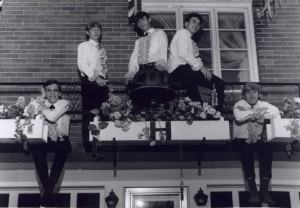
Tonto and the Renegades
Grand Ledge is located very nearly in the geographic center of the southern half of Michigan’s Lower Peninsula. The city is named for the sandstone ledges along the Grand River which runs through the small town of roughly 8,000 residents. The ledges are a tourist attraction, and during the hazy, hot Michigan summers of the 1960’s, a destination point for area youngsters engaging in sometimes dangerous behavior while climbing the ledges, hanging out on the railroad trestle that crossed the Grand, or swimming the river.
When Tonto and The Renegades first came together during the 8th grade in 1963, Grand Ledge was an area dominated by farming. Only one of the original members grew up on a farm, but agriculture provided summer jobs for area youths at $.75 per hour, and $6.00 a day was pretty good money for a teen back in the day. Better yet, when the work was done, kids could run around with minimal parental supervision and without concerns about crime or issues of personal safety.
Tom Kirby grew up in a subdivision just outside of Grand Ledge and expressed an interest in rhythm instruments early on. His mother used to claim that he was drumming in the womb. Although they didn’t play instruments, Kirby’s parents were very supportive of his interest in music. They bought his first drum set when he was in the 6th grade and arranged for lessons. Tom was lucky to get excellent instruction from a retired music professor from Michigan State University who lived in the area and was teaching privately.
The following year, Kirby started playing in his first band, the Grandaires, along with his older brother Randy. Although the group only lasted eight months, it was a valuable learning experience. The Grandaires played covers of Chuck Berry, Ray Charles, and other hits of the day at Grand Ledge High School and a few other local gigs before disbanding.
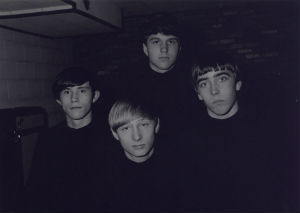
Tonto and The Renegades: (l to r) Gary Richey, Tom Kirby, Bill Ford, Terry Slocum.
Terry Slocum grew up on a farm. Slocum started out playing the clarinet his mother purchased for him because she loved the music of Pete Fountain. Terry, however, had already become a fan of rock and roll through listening to his brother’s record collection and grooving to the sounds of rockabilly, R&B, and early Motown.
The tipping point came when Slocum saw the Beatles perform on the Ed Sullivan Show and knew immediately that playing rock and roll was what he wanted to do. He recalled, in a recent interview, that he took the clarinet down to Marshall Music in Lansing and traded it for a guitar the very next day. Although his father told him that he’d never amount to anything with the instrument, Terry spent most of his spare time in his room practicing, determined to prove his dad wrong.
Bill Ford grew up next to Highway 43 on the outskirts of Grand Ledge. His father operated a gas station in Lansing, while his mother stayed home to care for Bill and his sister. He first started playing guitar in 1962. Ford believes his parents encouraged his interest in the guitar because they were tired of listening to his attempts to play the drums. He took lessons, and was soon good enough to get a job teaching guitar at the Zvonar Music Studios in Charlotte, Michigan.
Ford remembers being “completely blown away listening to the music of the Beatles”. He didn’t own an amplifier at this point, so he experimented by using a tape recorder that belonged to one of his uncles. Unfortunately, Bill blew out the speakers on the tape recorder and was forced to start saving for a real amp.
Kirby, Slocum, and Ford started jamming together informally during their eighth grade year. They played in a number of talent shows at their middle school and received a very positive response from their audiences which, in turn, spurred their interest in starting a band. Inspired by the Beatles and the encouragement of their peers, the trio formed “The Henchmen” later that year.
Gary Richey was a Grand Ledge classmate and a big fan of the Beatles and the British Invasion bands. Like Tom Kirby, he also grew up in a subdivision just outside of town. Richey owned a small tape recorder on which he used to tape himself singing along with the Beatles’ hits in his room. Because of his Native American heritage, he’d been given the nickname “Tonto” throughout his years at school. The name referred to the fictional character of Tonto, the American Indian sidekick of the Lone Ranger, who was portrayed by actor Jay Silverheels on the popular 1950’s television program.
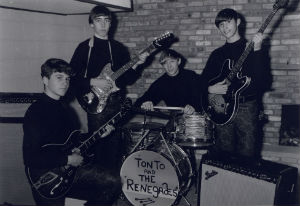
Richey’s parents were very supportive of Gary’s interest in music, and purchased a guitar and paid for his lessons. After two months of learning the basics, Richey was invited into the Henchmen. The Richey basement quickly became the band’s rehearsal space, and the foursome hung out there just about every day after school working on their music. Once the young band started to get some gigs, Mr. Richey volunteered to manage the fledgling group and help them with the business end of things.
Shortly after the quartet was formed, they decided on a name change. Terry Slocum claimed that no one was enamored with “Henchmen”, so they decided to use Gary’s nickname along with “Renegades” at the suggestion of classmate Toby Bates, a member of the Beaux Jens, a rival Grand Ledge band. The combination sounded right, and the band adopted it from then on.
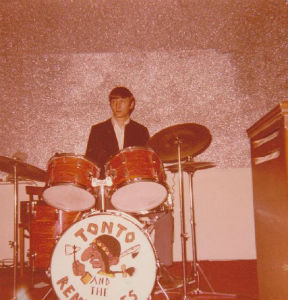
Tom Kirby with Dennis Preston’s band logo.
The newly christened Tonto and the Renegades now felt they needed to develop a cool band logo for Tom Kirby’s drum head. Through Gary Richey’s cousin, they were able to make contact with a young artist named Dennis Preston. The group gave him a few ideas, and Preston came back to them with an idea for a logo that was unlike anything else out there on the teen band circuit. It provided the band with an instant identity, and would help to move Tonto and The Renegades ahead of the growing pack of young area bands by matching artistic creativity with their increasingly tight musical and vocal performances.
Richey and Slocum did most of the singing, while Ford did back up and pitched in on three-part harmony. It was the harmony singing that really set them apart for the other area bands, most of which featured a single lead singer. The first gig as Tonto and The Renegades was at the Grand Ledge High School Senior Prom in the spring of 1964, during which Kirby’s older brother Randy came up from the audience and sang “What’d I Say”, a number he and Tom performed in the Grandaires. It wasn’t long before the band started to become popular in the Lansing area and was booked almost every weekend. During these early days before they had driver’s licenses, the band was driven to the gigs by either Mr. or Mrs. Richey.
The band members bought almost all of their equipment at Marshall Music, located on S. Washington Avenue in Downtown Lansing. It was a favorite hangout for the area’s young musicians, and most bought their instruments there. The store also sold records and stocked the local 45’s issued by the teen bands in and around Lansing. All the members of Tonto and The Renegades especially liked Bill Lewis, who worked at the store during that time and was not only very helpful, but also a good friend to all his young customers.
Tonto and The Renegades’ most important regular gig was at a teen dance club called The Sceen. Located at the intersection of M-43 and M-50 about 12 miles west of Grand Ledge, the building had formerly been a motel before it was completely gutted and turned into a very popular teen nightclub by owner Don Trefry. Boasting four stages, great acoustics, and an outside area that was as large as the inside of the club, The Sceen would pack in hundreds of kids from the surrounding small farming communities of Woodbury, Sunfield, Muliken, Needmore, Kelly, Sebewa, Clarksville, Lake Odessa, Gresham, Coats Grove, and Woodland. In Bill Ford’s words, “It was an absolute blast playing there”. In addition, top Michigan bands like The Bossmen, The Ones, and The Woolies were presented every weekend.
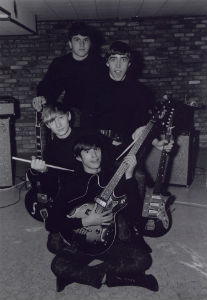
By this time, Gary Richey had started playing bass and Tonto and The Renegades had set up a very good working relationship with Trefry, who liked the band and also served as their booking agent. Trefry’s Sceen had dressing rooms, a small restaurant area, and enthusiastic audiences that always included lots of girls. To everyone’s delight, there were many young ladies who would soon be referred to as groupies, and the band soon learned that the farmers’ daughters from the small outlying areas were more aggressive and eager to please than even their big city cohorts.
In a recent interview, Bill Ford remembered that Trefry “booked the band in many other great places around Michigan, and for a bunch of high school kids, getting to play rock and roll at terrific teen nightclubs around the state was so much fun I will never forget it”. Some of the band’s favorite venues included The Hullabaloo in Lansing, Daniel’s Den in Saginaw, and especially the Club Ponytail in Harbor Springs. That club had formerly been a speakeasy during Prohibition and reportedly had connections to Al Capone. Tonto and The Renegades appeared there several times, once sandwiched between big name appearances by the Beach Boys and Mitch Ryder and The Detroit Wheels.
In 1966, the band decided to add a keyboard player to both improve their sound and to give them the ability to play a greater variety of material, including the ever popular Motown hits. It was very important for the teen bands of the 60’s to be able to cover the top songs on the charts. Kids came to hear and dance to their favorite songs heard on the popular AM radio stations, and bands were judged on how closely they could play those hits live in the teen clubs. Bands could work in some original material, especially if they had a single that got on the radio, but every band played mostly covers at this time.
It was Gary Richey who discovered Jeff Keast, and he was added to the band before they recorded their first single. Keast wasn’t from Grand Ledge and attended O’Rafferty Catholic High School in the Lansing Diocese. He was very talented musician and could play the organ and piano at the same time while singing and dancing around. During a 2012 band interview, Tom Kirby called Keast “one of the best he’d ever seen on stage”, while Terry Slocum described him as being “like Jon Lord of Deep Purple”. In an email, Bill Ford stated that he could remember “being very impressed by Jeff and how much better they sounded after he joined the band”.
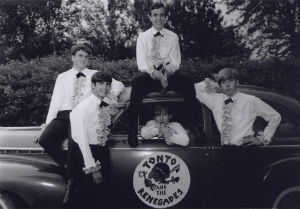
B. Ford, G. Richey, Jeff Keast (top), T. Kirby, and T. Slocum.
Don Trefry was aware of Dave Kalmbach’s recording studio in Sparta, Michigan, and set up the recording session for Tonto and The Renegades first single in late 1966. The band was very well rehearsed before they traveled to Sparta so that they wouldn’t waste any studio time. They practiced “Little Boy Blue” and “I Knew This Thing Would Happen” countless times in the Richey basement until they had perfected them. Trefry financed the recording that would be released on his own Sound Of The Sceen label, as Kalmbach offered his customers the interesting option of either releasing their singles on his Fenton Records or designing their own vanity label.
Kirby, Richey, and Slocum liked working with Dave Kalmbach. They found him very patient and felt that he was an excellent engineer who really knew what he was doing in the studio. Ford remembered the recording session at Sparta as being “pretty intimidating, and the idea of cutting a record scary”. He went on to say that Kalmbach did very well by the band; and that “he was impressed by how helpful he was both in the recording of the songs and with the great job he did with mixing the music after they were done”.
The band picked up their first batch of singles, packed in a cardboard box, at the American Record Pressing plant in Owosso. They placed the 45’s at Marshall Music and all the stores in Grand Ledge that sold records, and then drove to various radio stations to bring copies to DJs in the hopes of getting some airplay. In the mid-1960’s, it was possible for local bands to get their original music played on AM radio stations as the DJs still had the power to do their own programming at this time.
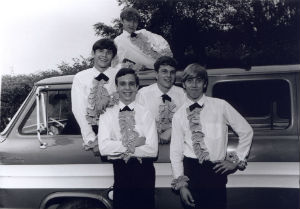
Both sides of the single got significant airplay, especially at station WJIM-AM out of Lansing, the hottest Top 40 station in Southwest Michigan. WJIM disc jockey Eric O. was a big supporter, and the band did a number of short promos at the station to further bolster the 45. Although “I Knew This Thing Would Happen” turned out to be the bigger hit at the time, it is the fuzz-drenched “Little Boy Blue” that the band is best remembered for.
Ford recalls how exciting it was hearing music they had made being played on the radio. The success of the single not only increased the popularity of the band, but also the amount of money that they could charge for playing. Ford also said that “playing in a popular band, particularly while still in high school, was so much fun that I can still remember exactly how I felt during certain performances”.
By 1967, Tonto and The Renegades were firmly established as one of the house bands that rotated regularly at the Sceen. The Beaux Jens, who also recorded a single on the Sound Of The Sceen label, and The Ones were also in the rotation. On the nights Tonto and The Renegades headlined, they would usually play three 45-minute sets, preceded by an opening band. Inspired by seeing the Kinks perform in ruffled shirts on television, Slocum helped expand their fashion sense by having his mother make ruffled shirts for the band. Their new look was then complimented with paisley slacks and Beatle boots.
The first bit of bad news for the band came when Jeff Keast left the group after just one year. Apparently Keast’s parents believed that he was playing “the devil’s music” and insisted that he quit the group. Keast’s departure put them in a bind, but he helped out by recommending a fellow O’Rafferty classmate named Dave Pung as his replacement on keyboards.
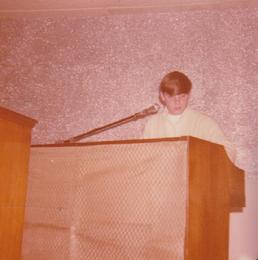
Dave Pung on keyboards.
The band had gotten to know Dick Wagner from the numerous times that he and his band, the Bossmen, had played at the Sceen. Wagner was already regarded as one of the best guitarists in the state and was a talented songwriter as well, having penned a half-dozen radio-friendly singles for the Bossmen before the band broke up in 1967.
Wagner was working with other groups as both a songwriter and producer while he was putting a new band together. He had been impressed with Tonto and the Renegades’ single, and told them he had some songs that would be perfect for them, and that he would be willing to produce their next record as well. He came to Gary Richey’s house and played several songs for the band on acoustic guitar. According to Tom Kirby, “Anytime You Want Some Lovin'” stood out immediately, and was everyone’s choice for the A-side of their second single.
The band’s first choice for the B-side was Wagner’s “First Day Of May”. After considering it, Wagner decided to save that song for the Frost, the new band he had formed with the former members of a Northern Michigan group called the Chevelles. Tonto and The Renegades then settled on a Wagner-penned rocker titled “The Easy Way Out” for the projected B-side.
Don Trefry again set up and financed the recording session at Dave Kalmbach’s Great Lakes Recording Studio in Sparta, but this time Dick Wagner would produce with Kalmbach engineering the session. Wagner wanted to incorporate horns on the recordings; and to save money, Tom Kirby approached Jerry Jensen, the band director at Grand Ledge High School, about using some horn players from the school band. Jensen recommended two underclassmen for the job, Jim Hall and Ernie Morrow.
It was a big thrill for Hall and Morrow to be part of the recording process. They joined the band in the Richey basement for rehearsals, while Wagner arranged the horn parts on the spot. Like the first single, the band rehearsed relentlessly to prepare for their second Sparta session.
While the first single had been recorded in a couple of hours, the second required a full eight-hour day in the studio to complete, even with all the rehearsals beforehand. Wagner’s more sophisticated ideas and production techniques required much more effort on everyone’s part, but the results were worth it.
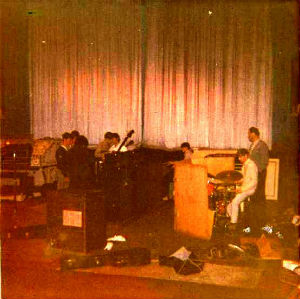
Dick Wagner producing Tonto and The Renegades’ 2nd single at Dave Kalmbach’s Great Lakes Recording Studio in Sparta, Michigan.
Wagner was experimenting with ideas even during the recording process. Gary Richey had come up with bass lines for both songs and had thoroughly rehearsed them back in Grand Ledge, but Wagner had him try something new during the recording of “Anytime You Want Some Lovin'”. Wagner eventually went back to Richey’s initial bass line when his new idea didn’t pan out, and also brought in Donny Hartman, his new Frost band mate, to play on the track. Hartman added harmonica to the final recorded version of the song; a fine mid-tempo rock ballad featuring gorgeous band harmonies.
The flipside, “The Easy Way Out”, rocked much harder and featured an interesting controlled guitar feedback by Dick Wagner that helped give the track its unique sound. The impressive 45 was released on Trefry’s Sound Of The Sceen label and immediately caused a sensation in the Lansing area with a big push from WJIM. Jim Hall and Ernie Morrow became instant celebrities at Grand Ledge High because of their participation in the recording. With both sides of the record getting significant airplay, Tonto and The Renegades made their television debut on Swing Lively, a teen music program broadcast on Channel 6 in Lansing.
With national labels expressing interest in both the band and its single, the future should have seemed bright for the group whose members all graduated from high school in June of 1968; but there were some dark clouds on the horizon. One was the Selective Service System by which the United States government maintained information on those young men between the ages of 18 and 25 potentially subject to military conscription, commonly known as the draft.
The other was a small Southeast Asian country called Vietnam. The United States’ involvement in South Vietnam went back as far as 1950 with the arrival of American military advisors as part of its Cold War policy of trying to contain the spread of communism. U.S. involvement escalated in the 1960’s, and combat units were deployed beginning in 1965. The number of U.S. troops steadily increased until it reached a peak of 543,400 in April 1969. The total number of Americans who served in South Vietnam would be 2.7 million. The majority of these would be the young men from the first wave of the “baby boomers”, born in the years 1946 to 1953. Of this group, more than 58,000 would die or remain missing, and 300,000 others would be wounded.
Many Michigan bands lost members at this time due to the draft. Tonto and The Renegades’ first casualty was Bill Ford. Like the other members of the band, Ford’s high school grades had suffered because of the time he devoted to the music and other activities he considered more important than scholastic achievement. After graduating from high school, he was faced with the very real possibility of being drafted and sent to Vietnam. By chance, Ford met an instructor at Lansing Community College while working at his dad’s gas station. The instructor convinced him to apply at the school as an alternative to being drafted. Ford decided to quit the band and enrolled at LCC in the fall of 1968. As a result, he was granted a 2-S classification whereby he would be deferred from the draft until graduation. Freed from band obligations, he did well at the community college and then transferred to Michigan State University where he earned a B.A. degree in political science.

Slocum, Kirby, and Richey near the end.
Tonto and The Renegades continued on as a quartet after Ford left. Terry Slocum got married in 1968. His marriage resulted in Slocum being classified 3-A, and deferred from the draft because of potential hardship to his dependents. Meanwhile, because of the success of the new single, the band was earning $1,000 per night and fielding offers from major record companies; Capitol, Columbia, Decca, and the U.S.A. label which had recently signed Saginaw’s Cherry Slush.
Gary Richey and Tom Kirby knew they were also facing the draft but tried to concentrate on the offers coming in for the band rather than think of Vietnam. Everyone in the band was excited by the Columbia Records’ deal. The label offered them a $10,000 advance, a national tour, and an album to be recorded at the conclusion.
Everything fell apart, however, with Tom Kirby’s draft notice in 1969. Kirby quickly volunteered for the Navy as soon as he was drafted, but still ended up serving three consecutive tours of duty in Vietnam aboard the Destroyer U.S.S. Hollister. Kirby saw action in the South China Sea, the Gulf of Tonkin, and numerous rivers and canals along the coastline of Vietnam, while seeing more death and mutilation than any young man under the age of 21 should ever have had to witness.
The band disintegrated following Kirby’s departure. Gary Richey was drafted soon after Tom, but he was rejected and classified 4-F because he suffered from the skin disease eczema. After the demise of Tonto and The Renegades, Richey and Slocum played briefly with a band called Headstone. Following that band’s break up, Richey joined another group named Thanx.
Terry Slocum’s marriage ended in 1971, and he moved to Lansing to help form a band called Virgin Thunder. As a result of his divorce, Slocum was now reclassified 1-A. When the draft lottery was instituted, Slocum was one of the unlucky young men to draw a low number, meaning that he was certain to be drafted. He then volunteered for the Army so that he could select where he wanted to serve rather than be drafted and sent to Vietnam.
Tom Kirby returned home in 1971, married a girl from Grand Ledge, and went to work at the Michigan Secretary of State’s office as a systems analyst for the Department of Information Technology. Now retired and remarried, Tom started a two-man band in 2009 with Jim Hall called Trail’s End; and they play regularly at Mija’s Grey Wolf Inn in Grand Ledge.
Gary Richey worked construction for many years after leaving music in the 1970’s. Richey was injured at work, and is now on disability and living in Lansing.
Terry Slocum left Michigan after his hitch in the service, and moved to Memphis and then Florida. He has stuck with music over the years, played guitar in a slew of rock bands, but now concentrates on the blues. One of his great thrills as a musician was getting to jam with blues great Buddy Guy at a roadhouse in Clarksdale, Mississippi.
After getting married and graduating from MSU, Bill Ford moved to Wisconsin and began graduate studies at the University of Wisconsin–Madison. He then entered law school at UW-Madison and sold his guitar and amp from Tonto and The Renegades to pay his tuition. Ford worked as an attorney for 30 years in Wisconsin and retired in 2009.
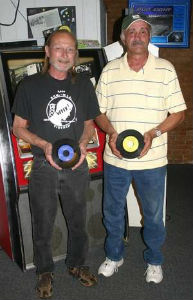
Tom Kirby and Gary Richey in 2012.
Although Tonto and the Renegades would never play together again after 1969, interest in the band was renewed by a highly influential album series called “Back From the Grave”, the brainchild of Tim Warren. The compilation albums were issued from 1983 to 1992 on Crypt Records in Hamburg, Germany. Now also available on CD, they concentrated on raw garage rock singles issued by American bands from 1964-67, dominated by fuzztone guitars and gritty vocals. Tonto and The Renegades’ “Little Boy Blue” was on one of the albums, resulting in the band gaining new fans from all over the world and more fame than they enjoyed during their heyday in the 1960’s.
All four of the recordings made by Tonto and The Renegades at the Great Lakes Recording Studio in Sparta, Michigan, were included in the excellent 2 CD “Scream Loud!! The Fenton Story” released in 2007. The CD release, along with the postings of You Tube videos featuring their songs, has served to further spread the music of the band around the world, far beyond the wildest dreams of those four young men growing up in Grand Ledge, Michigan.
Tonto and The Renegades were inducted into the Michigan Rock and Roll Legends online Hall of Fame in 2012. In addition, three of their recordings have been voted Legendary Michigan Songs: “Little Boy Blue” in 2008, along with “Anytime You Want Some Lovin'” and “No Easy Way Out” in 2012.
Video: Watch a slideshow video produced by MRRL of Tonto and The Renegades’ classic garage rock single “Little Boy Blue” by clicking below:
Dr. J. Recommends: “Scream Loud!!! The Fenton Story” 2 CD. Way Back Records. Marktgasse 17, D-72070 Tubingen, Germany.
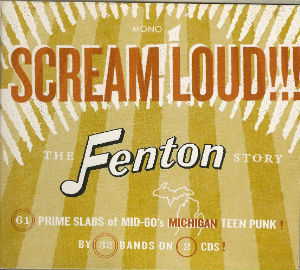
All four of the recordings done by Tonto and The Renegades can be found on this great collection of 45s that were produced during the 1960’s at Dave Kalmbach’s Great Lakes Recording Studio in Sparta, Michigan. The double CD boasts 61 cool garage rock tracks by 32 different bands, most from Southwest Michigan.
Dr. J
Special thanks to Gary “Dr. J” Johnson for being a friend of our website and for generously contributing his articles for our use, including the following one about Tonto and the Renegades. Please visit his great website at http://www.michiganrockandrolllegends.com/
We also want to thank Tom Kirby of Tonto and the Renegades for also being a loyal friend of our website and for being a constant contributor of memorabilia, photos and his memories of the rock scene of the 1960s.
Kim Rush, Doug Taylor, WHMHS
8/6

2 Responses to HOME